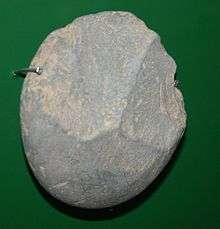flake
English


Pronunciation
- (UK) IPA(key): /fleɪk/
Audio (US) (file) Audio (AU) (file) - Hyphenation: flake
- Rhymes: -eɪk
Etymology 1
From Middle English flake (“a flake of snow”), from Old English *flacca and/or Old Norse flak (“loose or torn piece”) (compare Old Norse flakna (“flake or chip”)), from Proto-Germanic *flaką (“something flat”), from Proto-Indo-European *pleh₂- (“flat, broad, plain”). Cognate with Norwegian flak (“slice, sliver”, literally “piece torn off”), Swedish flak (“a thin slice”), Norwegian flak, Danish flage (“flake”), German Flocke (“flake”), Dutch vlak (“smooth surface, plain”) and vlok (“flake”), Latin plaga (“flat surface, district, region”).
Noun
flake (plural flakes)
- A loose filmy mass or a thin chiplike layer of anything
- There were a few flakes of paint on the floor from when we were painting the walls.
- flakes of dandruff
- A scale of a fish or similar animal
- (archaeology) A prehistoric tool chipped out of stone.
- (informal) A person who is impractical, flighty, unreliable, or inconsistent; especially with maintaining a living.
- She makes pleasant conversation, but she's kind of a flake when it comes time for action.
- A carnation with only two colours in the flower, the petals having large stripes.
Translations
|
|
Verb
flake (third-person singular simple present flakes, present participle flaking, simple past and past participle flaked)
- To break or chip off in a flake.
- The paint flaked off after only a year.
- (colloquial) To prove unreliable or impractical; to abandon or desert, to fail to follow through.
- He said he'd come and help, but he flaked.
- (technical) To store an item such as rope in layers
- The line is flaked into the container for easy attachment and deployment.
- (Ireland, slang) To hit (another person).
Translations
Etymology 2
A name given to dogfish to improve its marketability as a food, perhaps from etymology 1.
Noun
flake (uncountable)
- (Britain) Dogfish.
- (Australia) The meat of the gummy shark.
- 1999, R. Shotton, Food and Agriculture Organization of the United Nations, Case studies of the management of elasmobranch fisheries, Part 1, page 746,
- Larger shark received about 10%/kg less than those in the 4-6 kg range. Most of the Victorian landed product is wholesaled as carcasses on the Melbourne Fish Market where it is sold to fish and chip shops, the retail sector and through restaurants as ‘flake’.
- 2007, Archie Gerzee, WOW! Tales of a Larrikin Adventurer, page 141:
- The local fish shop sold a bit of flake (shark) but most people were too spoiled to eat shark. The main item on the Kiwi table was still snapper, and there was plenty of them, caught by the Kiwis themselves, so no shortage whatsoever.
- 2007, Lyall Robert Ford, 101 ways to Improve Your Health, page 45:
- Until recently, deep-sea fish were considered to have insignificant levels of mercury but even these now contain higher levels than they used to, so you should also avoid the big fish like tuna, swordfish, and flake (shark) that are highest up the food chain.
- 1999, R. Shotton, Food and Agriculture Organization of the United Nations, Case studies of the management of elasmobranch fisheries, Part 1, page 746,
Etymology 3
Compare Icelandic flaki?, fleki?, Danish flage, Dutch vlaak.
Noun
flake (plural flakes)
- (Britain, dialectal) A paling; a hurdle.
- A platform of hurdles, or small sticks made fast or interwoven, supported by stanchions, for drying codfish and other things.
- English Husbandman
- You shall also, after they be ripe, neither suffer them to have straw nor fern under them, but lay them either upon some smooth table, boards, or flakes of wands, and they will last the longer.
- English Husbandman
- (nautical) A small stage hung over a vessel's side, for workmen to stand on while calking, etc.
- (nautical) Alternative form of fake (“turn or coil of cable or hawser”)
- Frank T. Bullen, The Cruise of the Cachalot: The Story of a New Bedford Whaler
- Flake after flake ran out of the tubs, until we were compelled to hand the end of our line to the second mate to splice his own on to.
- Frank T. Bullen, The Cruise of the Cachalot: The Story of a New Bedford Whaler
References
- flake in Webster’s Revised Unabridged Dictionary, G. & C. Merriam, 1913.